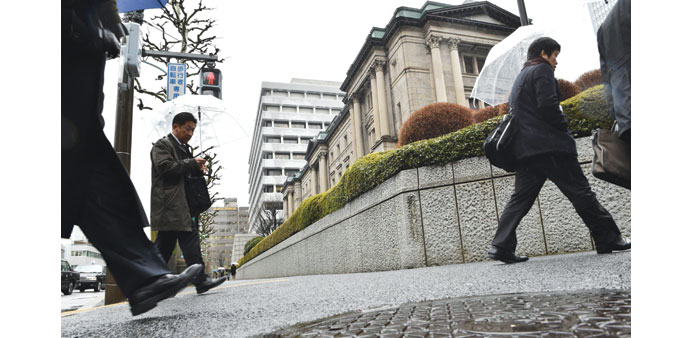Pedestrians walk past the Bank of Japan building (rear) in Tokyo. The BoJ officials are gaining confidence in the resilience of the nation’s economy, while keeping a close eye on the impact of low oil prices on inflation expectations.
Bloomberg
Tokyo
Bank of Japan (BoJ) officials are gaining confidence in the resilience of the nation’s economy, while keeping a close eye on the impact of low oil prices on inflation expectations, according to people familiar with the central bank’s discussions.
Indicators have improved in the run-up to the BoJ’s policy decision due Friday, with revised gross domestic product data showing that Japan averted a mid-year recession and that capital spending increased. Data since the last meeting in November show the economy gradually has been gathering momentum in line with the bank’s expectations, according to the people, who asked not to be identified because the talks are private. Though Japan’s inflation rate remains distant from the BoJ’s 2% target, the board has decided to keep policy unchanged this year, saying low oil prices have held down consumer costs. Given the renewed slide in crude oil in recent weeks, and the risk that it will suppress prices long term, officials are closely watching gauges of inflation expectations, the people said.
“The BoJ is holding a ‘wait and see strategy,’” Deutsche Bank economists including Kentaro Koyama in Tokyo wrote in a December 11 research note. “It is waiting for the effects of the energy price decline to fade out, allowing the economic recovery to narrow the output gap and boost inflation.”
Companies’ have lowered their inflation forecasts in the past six months, according to the BoJ’s Tankan inflation survey released, as slumping oil prices undercut the effects of the central bank’s monetary easing. Companies expect prices to rise 1.3% in three years’ time, down from 1.6% this time last year, and foresee inflation of 1.4% in five years, down from 1.7%.
BoJ Governor Haruhiko Kuroda on December 8 reiterated his view that the trend for inflation was improving, while adding that the central bank won’t hesitate to adjust policy if needed. It hasn’t shifted policy since October 2014, when it boosted the annual target for expanding the monetary base to ¥80tn ($660bn).
Analysts have been putting off, or abandoning, their calls for any further increase in the BoJ’s asset purchases. Goldman Sachs Group earlier this month delayed its prediction for such action to April, from January.
The BoJ’s quarterly report on manufacturers’ sentiment on Monday gave little reason for action by the board this week. The main Tankan index of confidence among large manufacturers held at 12 in December.
Fiscal policy steps may also reduce the focus for now on the BoJ. The Abe administration is compiling a package of about ¥3.5tn aimed in part at supporting spending by lower- income households.
Lawmakers are also working on a corporate-tax cut for 2016 designed to encourage companies to boost investment at home.
Dubai oil dropped Monday to the lowest level since 2004. Koya Miyamae, an economist at SMBC Nikko Securities, wrote in a report Monday that the BoJ might have to lower its consumer-price inflation forecast to 1% for the next fiscal year, from 1.4%.



